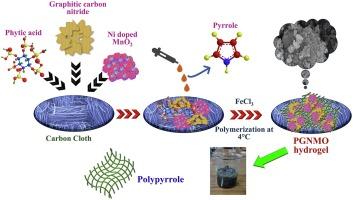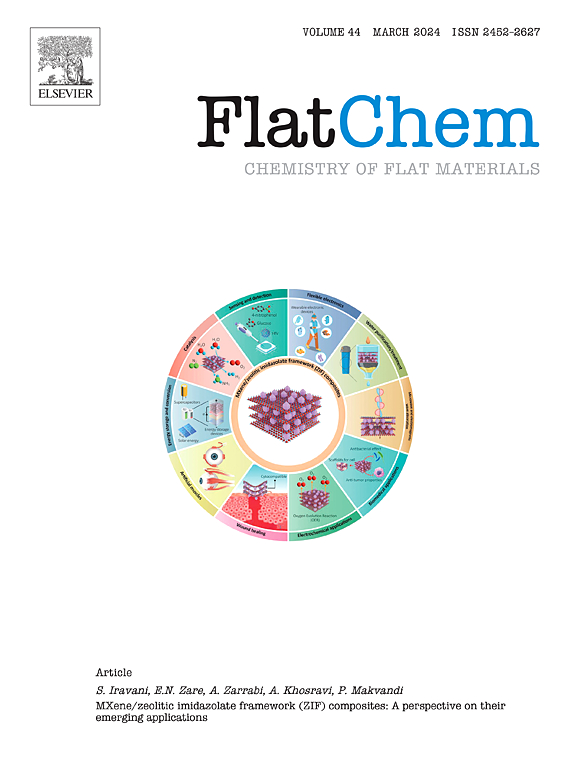作为高性能超级电容器电极的纳米结构掺杂镍氧化锰/聚吡咯/石墨化氮化碳水凝胶
IF 5.9
3区 材料科学
Q2 CHEMISTRY, PHYSICAL
引用次数: 0
摘要
聚吡咯水凝胶(Polypyrrole hydrogel,PH)具有导电性高、氧化还原性强、易于合成和环境友好等特点,是超级电容器(SC)的一种前景广阔的电极材料。本研究详细介绍了 pH 及其二元和三元纳米复合材料的合成。通过原位氧化聚合合成的三元纳米复合材料PPy-GCN-NMO(PGNMO)展现了独特的形态组合,具有优异的超级电容器性能。战略性地选择双电层电容(EDLC)和伪电容材料的协同作用有助于克服单个元素的局限性,共同实现优异的超级电容性能。对 PGNMO 电极的电化学研究表明,在 1 A/g 的条件下,该电极具有 3611 F/g 的出色比电容 (Cs)。此外,PGNMO 制成的对称器件在 1 A/g 时显示出令人印象深刻的 588 F/g Cs,并且具有优异的循环稳定性,在 6000 次循环后仍能保持 104.3%。此外,该器件在 1587.6 W/kg 时可提供 40.1 Wh/kg 的可观比能量,使 PGNMO 成为用于 SC 的柔性电极的领先产品。本文章由计算机程序翻译,如有差异,请以英文原文为准。

Nanostructured nickel doped manganese oxide/polypyrrole/graphitic carbon nitride hydrogel as high-performance supercapacitor electrodes
Polypyrrole hydrogel (PH) attributing high electrical conductivity, intriguing redox properties, ease of synthesis and environmental friendliness, is a prospective electrode material for supercapacitors (SCs). This work presented details of the synthesis of pH and its binary and ternary nanocomposites. The ternary nanocomposite PPy-GCN-NMO (PGNMO), synthesized via in-situ oxidative polymerization, demonstrates an exclusive combination of morphologies, leading to excellent supercapacitive performance. The strategically chosen synergy of electric double-layer capacitance (EDLC) and pseudocapacitive materials helps in overcoming the limitation of individual elements and collectively accounts for excellent supercapacitive performance. Electrochemical studies of PGNMO electrode provides an excellent specific capacitance (Cs) of 3611 F/g at 1 A/g. Moreover, the fabricated symmetric device of PGNMO exhibits impressive Cs of 588 F/g at 1 A/g, and exceptional cycle stability with 104.3 % retention after 6000 cycles. Additionally, the device delivers appreciable specific energy of 40.1 Wh/kg at 1587.6 W/kg, positioning PGNMO to the forefront of flexible electrodes for SCs.
求助全文
通过发布文献求助,成功后即可免费获取论文全文。
去求助
来源期刊

FlatChem
Multiple-
CiteScore
8.40
自引率
6.50%
发文量
104
审稿时长
26 days
期刊介绍:
FlatChem - Chemistry of Flat Materials, a new voice in the community, publishes original and significant, cutting-edge research related to the chemistry of graphene and related 2D & layered materials. The overall aim of the journal is to combine the chemistry and applications of these materials, where the submission of communications, full papers, and concepts should contain chemistry in a materials context, which can be both experimental and/or theoretical. In addition to original research articles, FlatChem also offers reviews, minireviews, highlights and perspectives on the future of this research area with the scientific leaders in fields related to Flat Materials. Topics of interest include, but are not limited to, the following: -Design, synthesis, applications and investigation of graphene, graphene related materials and other 2D & layered materials (for example Silicene, Germanene, Phosphorene, MXenes, Boron nitride, Transition metal dichalcogenides) -Characterization of these materials using all forms of spectroscopy and microscopy techniques -Chemical modification or functionalization and dispersion of these materials, as well as interactions with other materials -Exploring the surface chemistry of these materials for applications in: Sensors or detectors in electrochemical/Lab on a Chip devices, Composite materials, Membranes, Environment technology, Catalysis for energy storage and conversion (for example fuel cells, supercapacitors, batteries, hydrogen storage), Biomedical technology (drug delivery, biosensing, bioimaging)
 求助内容:
求助内容: 应助结果提醒方式:
应助结果提醒方式:


